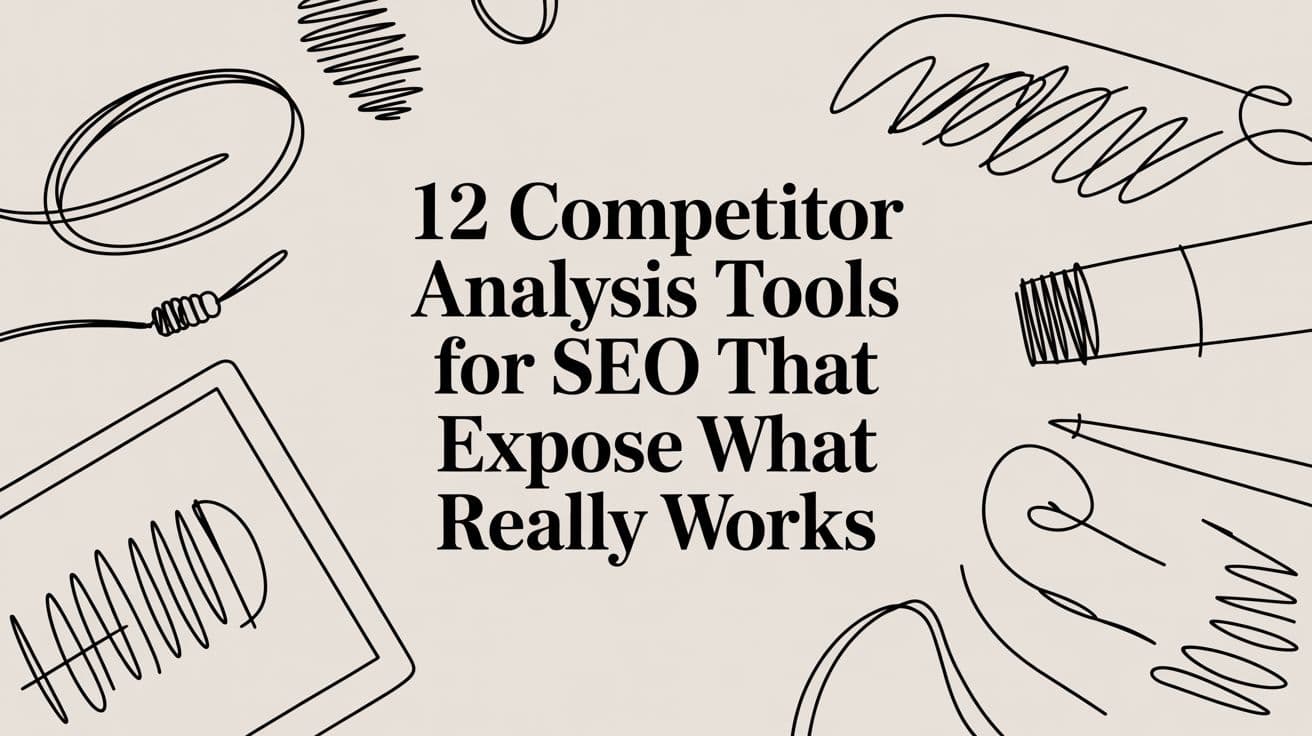You see competitors ranking for your target keywords. It's not luck. It's a system.
The real problem isn't a lack of effort; it's a lack of visibility into their system. You're flying blind without the right data. This guide skips the obvious fluff and shows you the specific competitor analysis tools for SEO that give you that visibility.
We'll go beyond generic feature lists. This is an honest assessment of what each tool is actually good for.
Before you pick a tool, you need a framework. A tool is useless if you don't know which questions to ask. A solid approach, as outlined in this a comprehensive guide on how to conduct competitor analysis, ensures you're looking for the right data from the start.
This guide will show you how to answer the questions that matter:
- Which keywords drive their valuable traffic?
- Where are their most authoritative backlinks coming from?
- What content gaps can you exploit right now?
- Are they being mentioned in AI search results where you are not?
The goal is to move from guessing to a strategy built on hard data. You'll learn which tools are best for which jobs, so you can pick the right one for your specific needs—whether you're a founder, agency pro, or in-house marketer.
1. AI SEO Tracker
AI SEO Tracker focuses on a different battlefield: AI-powered answer engines.
While other tools track Google rankings, this one shows you where you—or your competitors—are cited in ChatGPT, Gemini, and Perplexity responses. It's built for teams who know their customers are already using AI for research.
It answers the critical questions: Are we mentioned for high-intent prompts like “best CRM for small business”? Which of our pages are the models pulling from? Which competitors are capturing the citations we’re missing? This makes it one of the most forward-thinking competitor analysis tools for seo you can get.
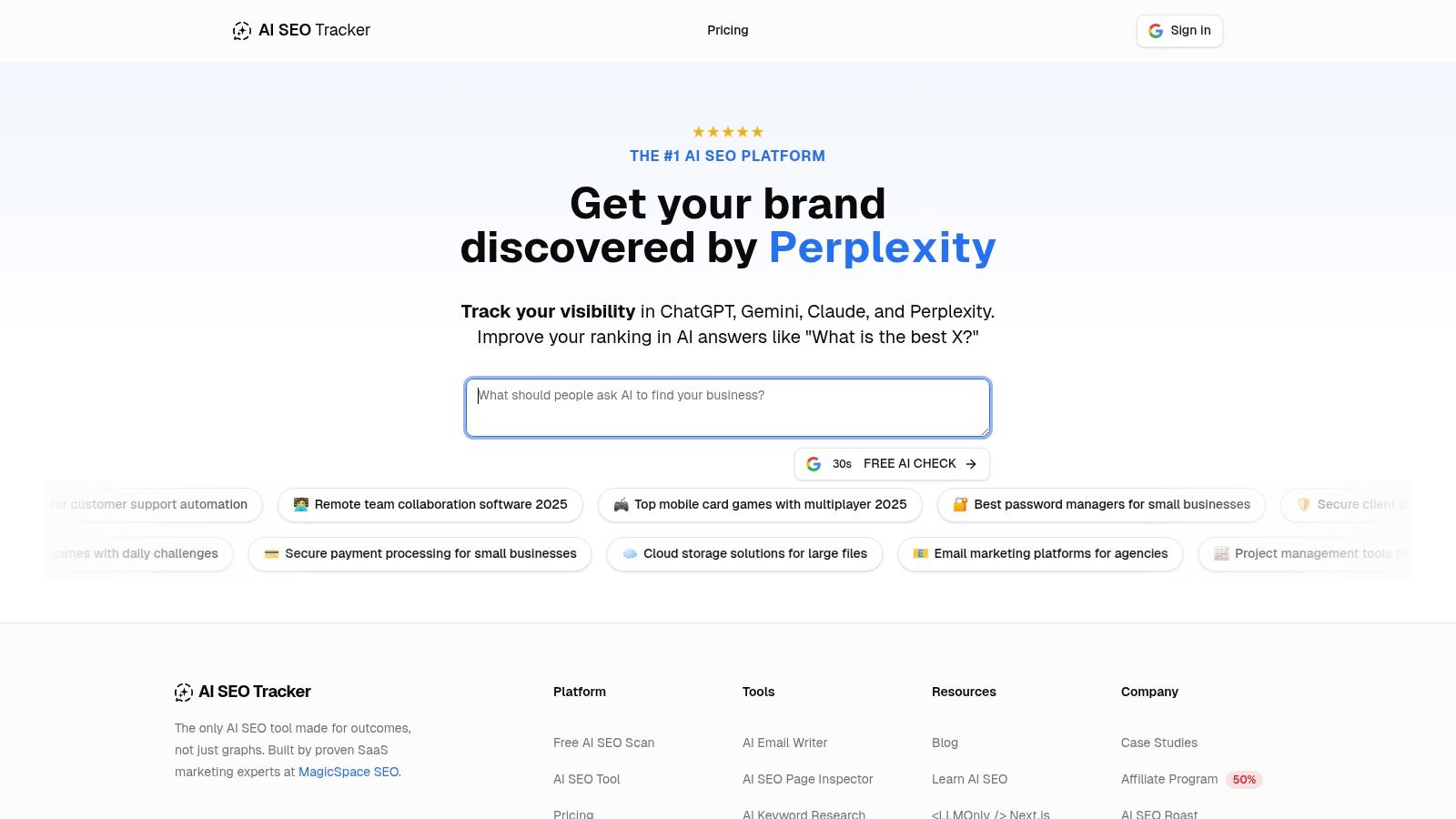
Why it's a smart choice
The tool connects AI visibility to specific, actionable fixes.
A standout feature is the Page Inspector. It scans any URL and shows you what a Large Language Model (LLM) can actually "see." It flags dynamic content that AI models often skip, giving you a clear path to fix it.
For example, a marketing agency used it to analyze a competitor’s popular "Marketing ROI Calculator" landing page. The Page Inspector revealed the interactive calculator itself was invisible to LLMs. Their competitor was only being cited for the generic text on the page, not the calculator's valuable outputs. The agency built a simpler, text-based ROI guide that quickly started earning citations in AI answers, stealing visibility from the "better" but technically invisible tool.
You can read their breakdown of other top AI SEO tools to see how they fit into the broader market.
Tradeoffs to consider
- Pros: Model-specific tracking across major LLMs, actionable page-level fixes, and analytics that connect AI visibility to revenue.
- Cons: Pricing requires a demo. The AI search space also evolves quickly, meaning you need to stay on top of the data.
- Website: https://aiseotracker.com
2. Ahrefs
Ahrefs is an SEO powerhouse, but its main advantage has always been its massive backlink index.
Its Site Explorer is the core of its competitive analysis toolkit. Plug in any competitor’s domain to get an instant, comprehensive view of their organic keywords, backlink profile, and top content. Ahrefs also provides historical data, letting you track a competitor's strategic shifts over time.
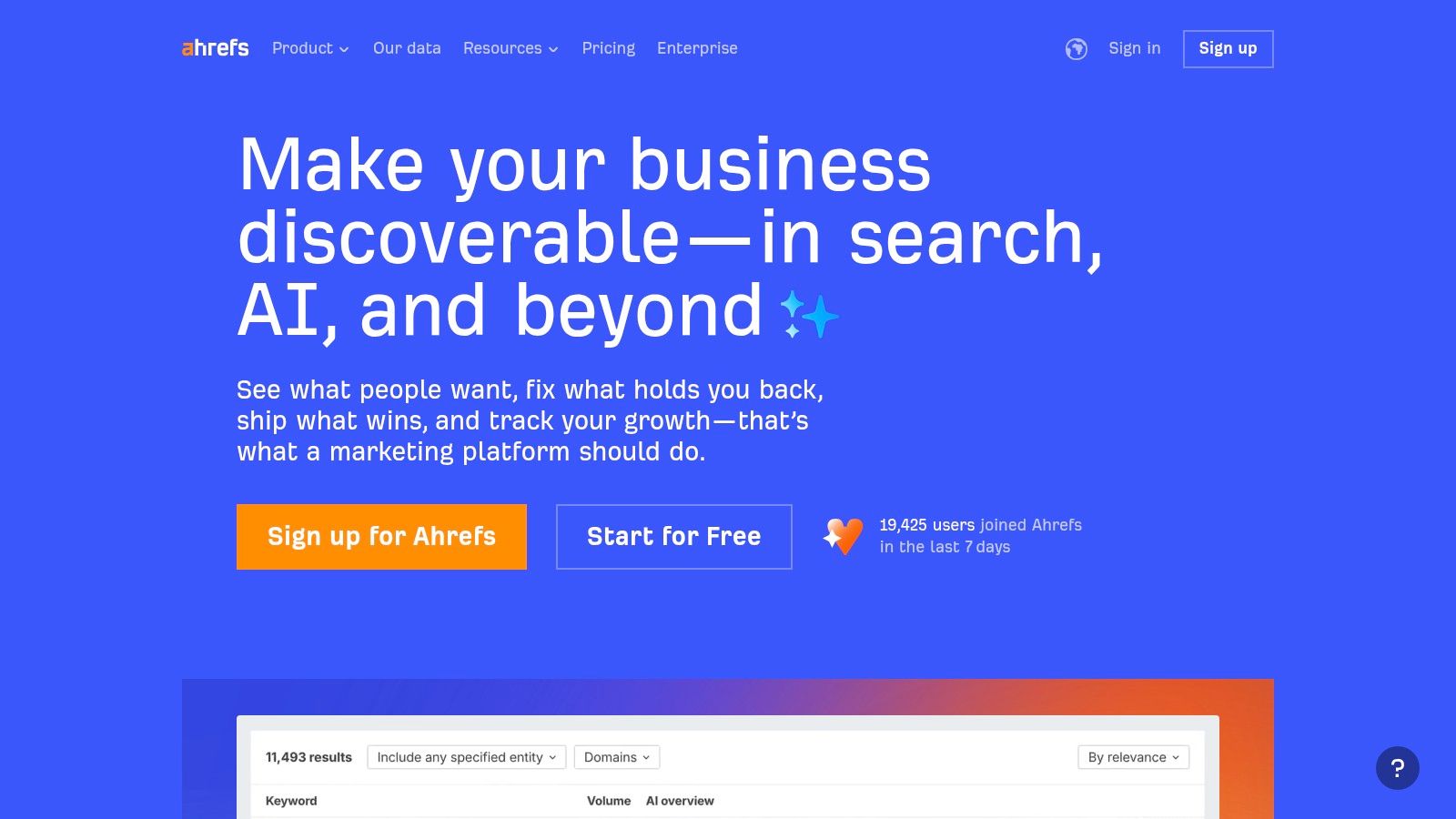
Why it's a smart choice
The Content Gap feature is the most practical place to start. It compares your domain against several competitors to find keywords they rank for that you don't. This immediately gives you a targeted list of content ideas with proven demand.
For link building, you can analyze a competitor's recent backlinks to find replicable sources. This helps you understand why a competitor is succeeding. For an in-depth look at how its tracking is evolving, you can explore how Ahrefs integrates AI for rank tracking.
Tradeoffs to consider
- Pros: Its backlink database is arguably the best in the industry. The user interface is clean and makes complex data easy to understand.
- Cons: Ahrefs no longer offers a simple free trial. Its credit-based pricing can get expensive quickly if you have a large team or need lots of data exports.
Visit Ahrefs: https://ahrefs.com
3. Semrush
Semrush is an all-in-one marketing platform. Its competitive research tools give you a panoramic view of a competitor's entire digital strategy—organic search, paid ads, content, and social media.
This makes it one of the most comprehensive competitor analysis tools for SEO if you need to understand the full marketing mix. Its Domain Overview gives a high-level report card on any website.
Why it's a smart choice
The strength is in direct comparison. The Keyword Gap and Backlink Gap features let you benchmark your domain against up to four competitors at once. This instantly reveals specific keywords you're missing or link opportunities you haven't found.
Its Traffic Analytics tool provides estimated traffic data and audience overlaps. This is invaluable for reverse-engineering a competitor's most effective funnels.
Tradeoffs to consider
- Pros: The incredibly broad feature set covers almost every aspect of digital marketing. Powerful reporting makes it a favorite for agencies.
- Cons: The sheer number of tools can be overwhelming for beginners. The price can be a significant investment for teams needing multiple users.
Visit Semrush: https://www.semrush.com
4. Similarweb
Similarweb offers a different perspective, focusing on market-level intelligence instead of just SEO data.
It shows you a competitor's overall digital footprint, including traffic sources, audience demographics, and engagement metrics. This helps you answer bigger questions about market share, not just rankings. It’s the right tool when you need to understand a competitor's entire online strategy.
Why it's a smart choice
Its strength is traffic and audience benchmarking. You can directly compare your site's traffic volume, bounce rate, and session duration against rivals. The Top Pages feature reveals a competitor’s most visited content across all channels, not just organic search.
This top-down view helps you spot opportunities in channels you might be ignoring. This broader perspective is essential for accurately monitoring your overall share of voice.
Tradeoffs to consider
- Pros: Provides powerful traffic and audience data that most pure SEO tools lack. Excellent for high-level strategic planning.
- Cons: The entry-level price is significantly higher than other SEO suites, making it less accessible for small businesses.
Visit Similarweb: https://www.similarweb.com
5. Moz Pro
Moz Pro is a veteran in the SEO space, known for making complex data accessible.
Its strength is its user-friendly interface and robust educational resources, making it a good entry point for those newer to SEO. It provides a full suite of tools that are powerful yet easy to navigate.

Why it's a smart choice
The Link Explorer tool lets you analyze a competitor’s backlink profile using Moz’s proprietary metrics like Domain Authority (DA). You can find their top linked pages to inform your content strategy.
A practical and unique feature is the MozBar, a browser extension that gives you instant SEO metrics for any page you visit. This allows for quick, on-the-fly competitor checks.
Tradeoffs to consider
- Pros: The platform is exceptionally beginner-friendly. Its Domain Authority metric remains a popular industry benchmark.
- Cons: Moz Pro's backlink index is generally smaller than Ahrefs or Semrush. Higher data limits require upgrading to more expensive plans.
Visit Moz Pro: https://moz.com/products/pro
6. SpyFu
SpyFu focuses intensely on competitor keyword and advertising intelligence. It excels at reverse-engineering a competitor’s search marketing playbook.
You can see every keyword they've ever ranked for and every ad they've bought on Google, with historical data going back over a decade.

Why it's a smart choice
SpyFu’s standout feature is "Kombat," which compares your domain against two competitors to visualize shared and exclusive keywords. It’s a fast way to find keyword gaps.
For PPC analysis, you can download a competitor's entire profitable keyword list and view their ad copy variations. This provides a strong foundation for your own paid campaigns.
Tradeoffs to consider
- Pros: Extremely budget-friendly compared to full-suite platforms. Paid plans offer generous, often unlimited, data exports.
- Cons: It lacks deep technical site audit features. The interface can feel data-dense for beginners.
Visit SpyFu: https://www.spyfu.com
7. SE Ranking
SE Ranking offers a comprehensive SEO platform with a great price-to-performance ratio.
Its Competitive Research tool lets you analyze a rival's domain to uncover their organic and paid traffic strategies. The platform provides a balanced mix of high-level dashboards and granular data.
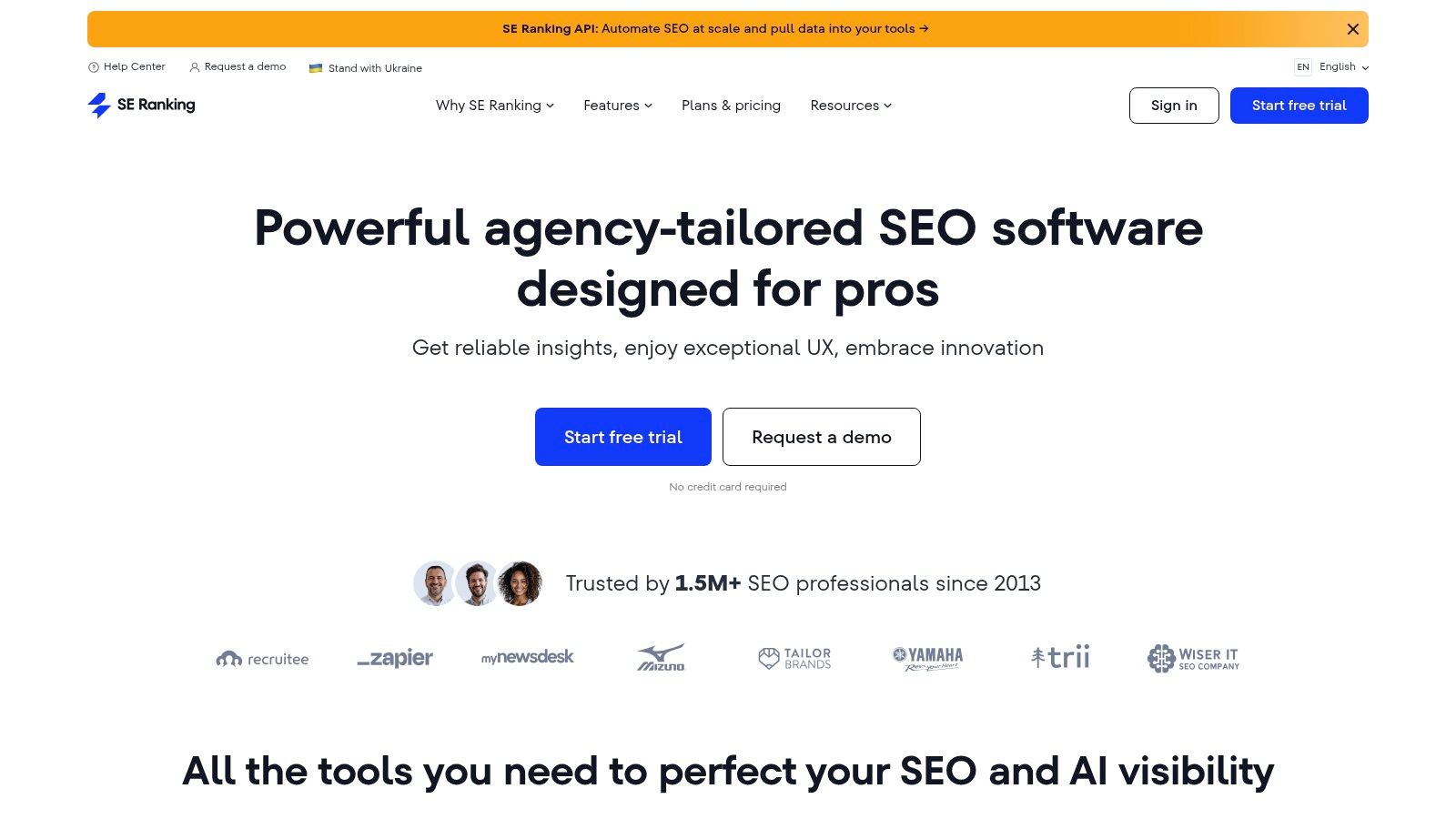
Why it's a smart choice
After identifying a competitor's top keywords, you can immediately add them to the Rank Tracker tool to monitor their performance against your own.
The "Share of Voice" metric calculates a domain's visibility across a tracked keyword group, offering a clear benchmark of your market presence versus competitors. Agencies particularly benefit from its white-label reporting.
Tradeoffs to consider
- Pros: Delivers an exceptional set of features for its price. The 14-day free trial requires no credit card.
- Cons: The user interface can feel dense and may require some time to learn. Some advanced features are reserved for higher-tier plans.
Visit SE Ranking: https://seranking.com
8. SISTRIX
SISTRIX is a highly respected SEO platform, particularly in European markets, known for its proprietary Visibility Index.
This core metric offers a long-term perspective on a website's Google performance. It provides a single, reliable score to benchmark your domain's search presence against competitors over many years.
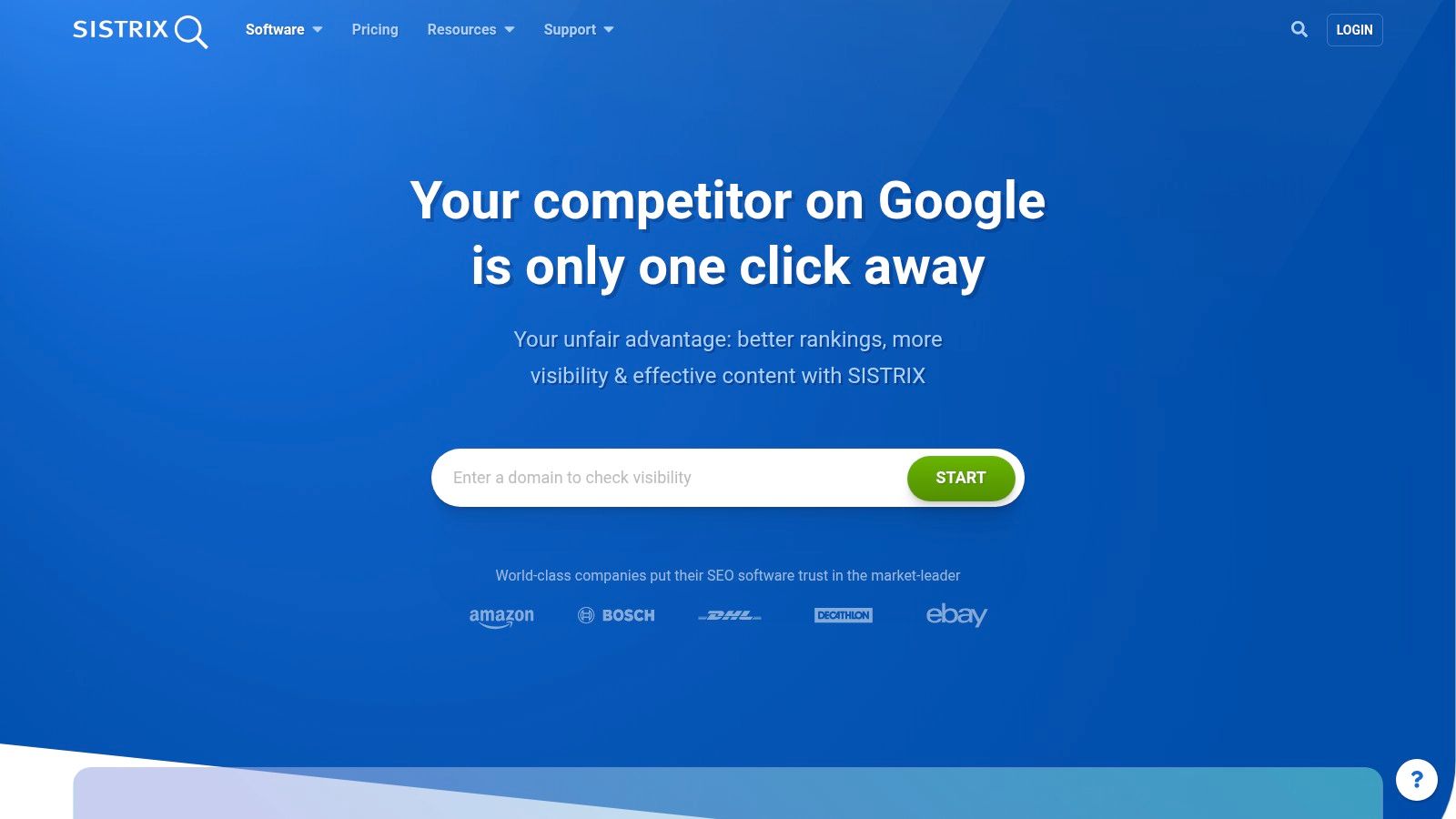
Why it's a smart choice
You can instantly plot your Visibility Index against multiple competitors to see who is gaining or losing ground. The "Winners & Losers" feature shows which domains saw the biggest visibility shifts after a Google algorithm update.
For content strategy, you can analyze a competitor’s top-performing directories to understand which content drives their organic success.
Tradeoffs to consider
- Pros: The historical Visibility Index is an invaluable metric for long-term strategic analysis. The ability to cancel monthly provides flexibility.
- Cons: Pricing is listed in Euros. The user interface and some data points are more tailored to European markets.
Visit SISTRIX: https://www.sistrix.com
9. Majestic
Majestic is a veteran in the SEO space with a laser focus on backlink intelligence.
It stands out by providing its own metrics, like Trust Flow, which measures the quality of a website’s backlink profile. This link-centric approach lets you dissect a competitor's link-building strategy with incredible depth.
Why it's a smart choice
The Clique Hunter tool is a standout feature. It identifies websites that link to multiple competitors but not to you, revealing high-value link opportunities.
The Compare Sites feature provides a direct head-to-head visualization of backlink history for up to five domains. This is ideal for benchmarking your link velocity and quality.
Tradeoffs to consider
- Pros: Its deep, link-centric datasets have long historical coverage. It offers flexible monthly or annual billing.
- Cons: Majestic’s specialization in links means it lacks all-in-one features like keyword research or rank tracking.
Visit Majestic: https://majestic.com
10. BuzzSumo
BuzzSumo excels at content-centric competitive analysis.
It reveals what content is actually resonating with real audiences across the web and social media. You can input any competitor's domain and instantly see their most shared and linked-to articles. This gives you a blueprint of the topics and formats that work in your niche.
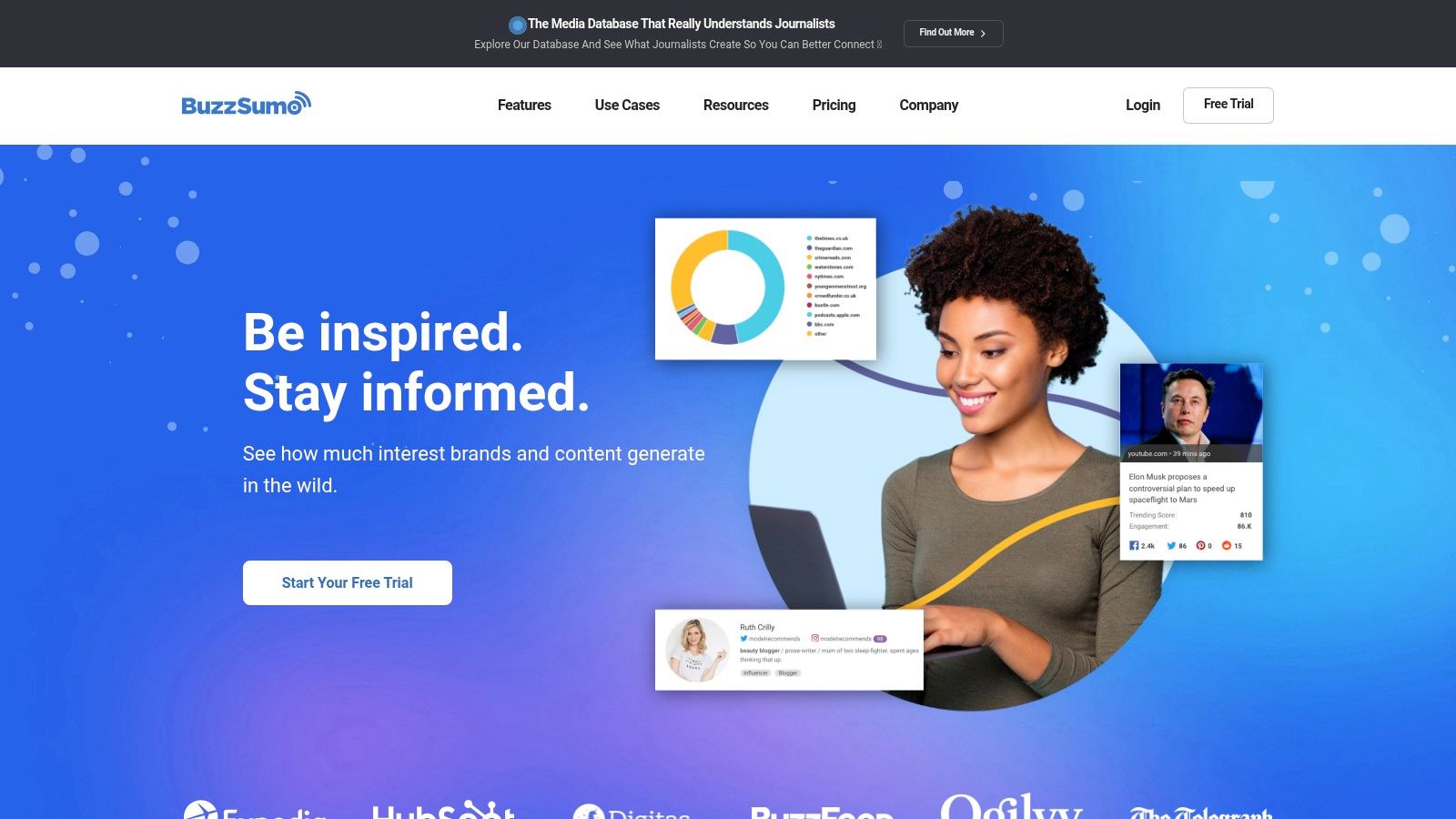
Why it's a smart choice
The Content Analyzer is its core strength, allowing you to benchmark your content performance against competitors by social shares and backlinks.
A SaaS company can analyze a competitor’s blog and find that their case studies get twice as many backlinks as their listicles. This provides a clear signal on where to invest content resources. Its influencer discovery tools also help you find journalists who have shared competitor content, creating a ready-made outreach list.
Tradeoffs to consider
- Pros: Unmatched for content benchmarking and discovering proven content ideas based on real engagement data.
- Cons: There is no ongoing free plan. Accessing advanced functionality requires moving to higher-priced tiers.
Visit BuzzSumo: https://buzzsumo.com
11. G2 (SEO Tools Category)
G2's SEO Tools category isn't an analysis tool itself—it’s a research hub for evaluating the tools.
It aggregates hundreds of verified user reviews for platforms like Semrush and Ahrefs. Instead of running analysis, you use G2 to analyze the analyzers. This is an invaluable first stop for shortlisting tools that fit your needs and budget.
Why it's a smart choice
The "Grid" reports plot tools based on user satisfaction and market presence, offering a quick visual of industry leaders. You can filter the category by specific features like "Competitor Analysis."
A practical use case is building a business case for a new tool. You can pull direct quotes from verified reviews to present a well-rounded proposal to your team. It helps answer the question, "Which tool do our peers actually prefer and why?"
Tradeoffs to consider
- Pros: Provides a broad market overview and direct access to current user sentiment. Verified reviews offer candid insights.
- Cons: Sponsored placements can influence which tools appear most prominently. Always verify pricing on the vendor's official website.
Visit G2 (SEO Tools Category): https://www.g2.com/categories/seo-tools
12. AppSumo
AppSumo is a marketplace that frequently features lifetime deals on up-and-coming software.
Instead of a high-priced monthly subscription, you can find niche utilities and rank trackers for a one-time fee. This is ideal for startups, freelancers, or teams on a tight budget looking to build a custom SEO stack.
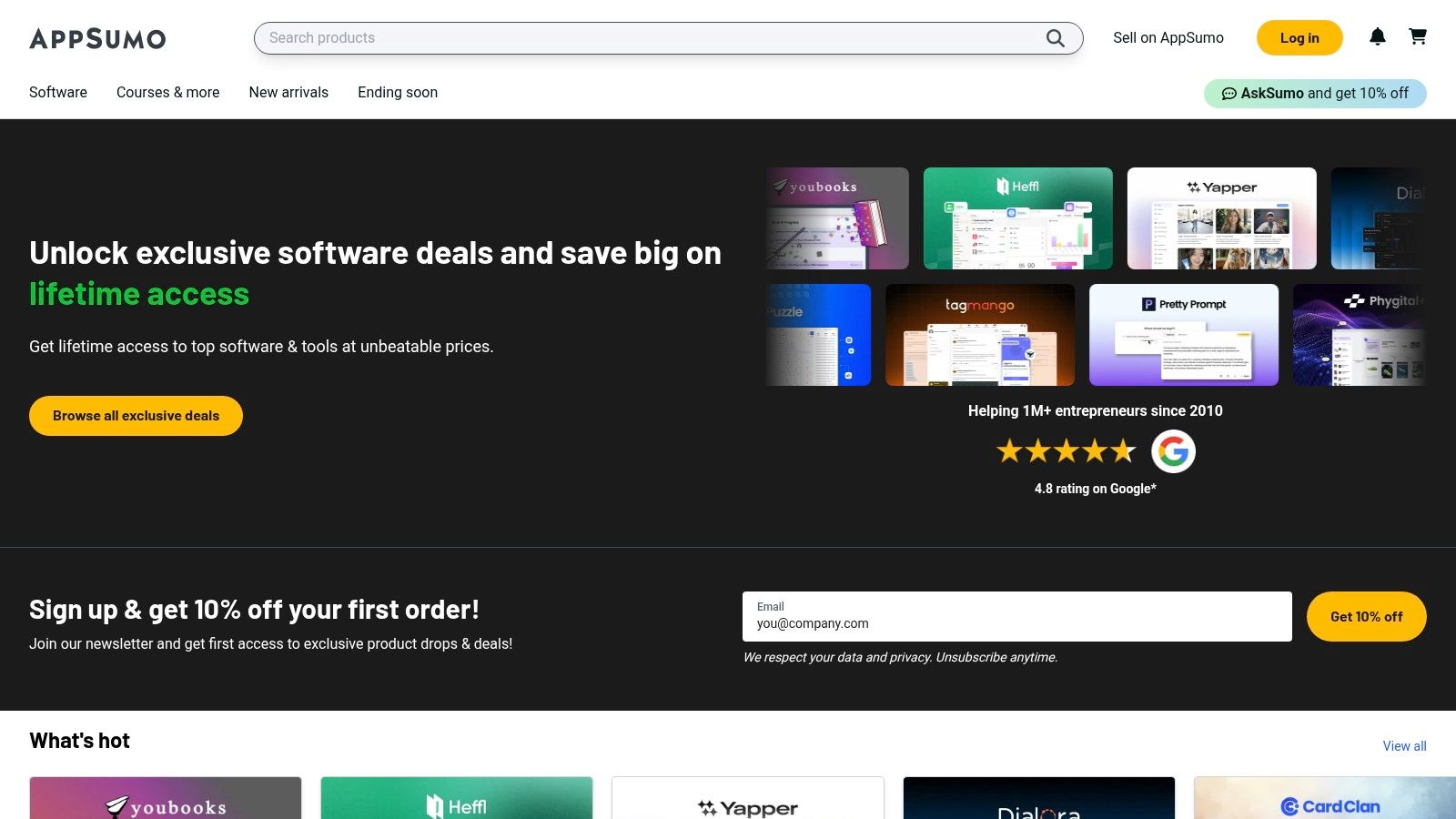
Why it's a smart choice
The main use case is opportunistic tool acquisition. By checking its listings, you can find emerging tools at a fraction of their future price. For example, a new SERP analysis tool or one that excels at tracking ad copy.
The 60-day refund window on most deals provides a safety net, allowing you to test a tool's practical value before committing.
Tradeoffs to consider
- Pros: The potential for significant savings is the main draw. The generous refund policy makes experimenting low-risk.
- Cons: Tool quality and long-term viability can be inconsistent. Deals are time-sensitive and rotate frequently.
Visit AppSumo: https://appsumo.com
Top 12 SEO Competitor Analysis Tools Comparison
| Tool | Core / Unique (✨) | AI / Model Visibility | Quality (★) | Value / Pricing (💰) | Target Audience (👥) |
|---|---|---|---|---|---|
| AI SEO Tracker 🏆 | ✨ Page Inspector, AI SOV dashboards, revenue calculator, automated action plans | Model‑level citations across ChatGPT, Gemini, Claude, Perplexity | ★★★★★ | 💰 Free AI scan; demo/pricing on request | 👥 SaaS marketers, SEO teams, growth leaders, agencies |
| Ahrefs | ✨ Site Explorer, Keywords Explorer, Backlink index, Rank Tracker | Limited LLM insights (traditional SEO data) | ★★★★★ | 💰 $$$$ (premium) | 👥 SEO pros, agencies, in‑house analysts |
| Semrush | ✨ Cross‑channel visibility (SEO + PPC), Position Tracking, Market intel | Limited LLM insights | ★★★★★ | 💰 $$$$ (enterprise/scale) | 👥 Agencies, enterprises, growth teams |
| Similarweb | ✨ Traffic & audience benchmarking, top pages, market sizing | Minimal / no LLM focus | ★★★★☆ | 💰 $$$$ (enterprise) | 👥 Market analysts, strategy teams |
| Moz Pro | ✨ Link Explorer, Rank Tracking, MozBar, beginner resources | Limited LLM visibility | ★★★★☆ | 💰 $$$ (starter → scalable) | 👥 Beginners, SMBs, small agencies |
| SpyFu | ✨ Competitor keywords, historical PPC/ad data, unlimited exports | No LLM focus | ★★★★☆ | 💰 $$ (budget‑friendly) | 👥 SMBs, PPC/SEO competitors |
| SE Ranking | ✨ Daily rank tracking, site audits, Share of Voice, API | Limited LLM insights | ★★★★☆ | 💰 $$ (strong price‑to‑features) | 👥 Agencies, SMBs, freelancers |
| SISTRIX | ✨ Visibility Index, historic benchmarking, EU focus | No LLM focus | ★★★★☆ | 💰 $$$ (EUR pricing) | 👥 European SEOs, analysts |
| Majestic | ✨ Deep backlink indexes, Trust Flow & topical metrics | No LLM focus | ★★★★☆ | 💰 $$ (link‑centric value) | 👥 Link analysts, researchers |
| BuzzSumo | ✨ Content performance, influencer/journalist discovery, alerts | No LLM focus | ★★★★☆ | 💰 $$$ (content teams) | 👥 Content teams, PRs, marketers |
| G2 (SEO Tools) | ✨ Verified reviews, side‑by‑side comparisons, vendor pages | N/A (marketplace) | ★★★★☆ | 💰 Free browse; vendor pricing varies | 👥 Buyers, procurement, shortlisters |
| AppSumo | ✨ Lifetime deals & heavy discounts on SaaS tools | N/A (deals marketplace) | ★★★☆☆ | 💰 $ (one‑time deals vary) | 👥 Budget buyers, startups, solo founders |
Turn Competitor Data Into Your Action Plan
You've just seen the landscape of the best competitor analysis tools for SEO. But a tool is useless without a clear strategy.
Information without action is just noise.
The goal isn't to collect mountains of data. It's to find specific, actionable insights that give you an edge. The right tool doesn't just show you what your competitors are doing; it reveals why their strategy works and exposes the gaps you can exploit.
Don’t fall into analysis paralysis.
Focus is your most valuable asset.
From Insight to Implementation: Your Next 3 Steps
Instead of getting overwhelmed, commit to a simple, repeatable process.
- Find a Keyword Gap. Pick your single most important competitor. Use a tool like Ahrefs or SpyFu to find 3-5 high-intent keywords they rank for where you don't appear in the top 50. This is your immediate content priority list.
- Reverse-Engineer Top Backlinks. Take one of their top-ranking pages and analyze its backlink profile using Majestic or Moz. Isolate the top 5 most authoritative and relevant domains linking to them. This tells you what kind of content earns high-quality links in your niche.
- Audit for AI Visibility. As AI reshapes search, ranking is only part of the story. Take your most crucial landing page and run it through an AI-focused tool like AI SEO Tracker. The goal is to see if an LLM like GPT-4 can understand and surface your key value propositions.
Choose the Right Tool for the Job
The "best" tool aligns with your specific goals.
Consider this: A B2B SaaS company wants to outrank a larger competitor. They use Semrush to find keyword gaps and discover their rival ranks #2 for "Gantt chart software for remote teams."
Using Ahrefs, they see the competitor's ranking page has backlinks from top project management blogs. Instead of just copying the article, they create a better resource with video tutorials and templates. Then, they use AI SEO Tracker to ensure their new page is optimized for LLM comprehension, confirming their unique features are clearly articulated for models like Google's Gemini.
This multi-tool approach, grounded in a specific goal, is how you win.
Your mission is not to mimic your competition. It's to understand their playbook so you can build a better one. The competitor analysis tools for SEO in this guide are your instruments for deconstruction. Use them to turn their weaknesses into your strengths.
Ready to see how your content performs in the age of AI search? AI SEO Tracker is one of the few competitor analysis tools for SEO that focuses on how Large Language Models interpret your site versus your rivals. Sign up for AI SEO Tracker to uncover hidden opportunities and ensure your brand stands out in AI-driven search results.
